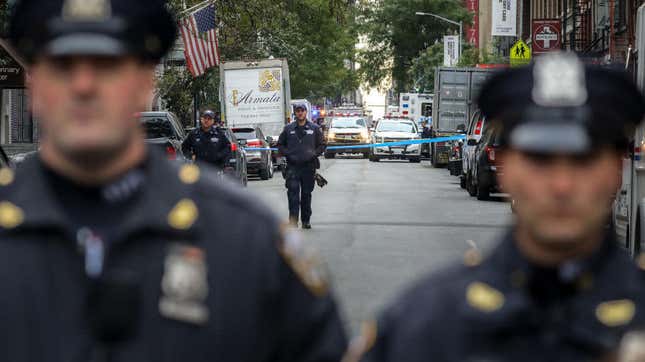
Just two weeks after Chanel Lewis, 22, was sentenced to life in prison without parole for the murder of jogger Karina Vetrano, shocking new details have emerged about the initial manhunt that left black and Latino men stripped of dignity, if not also their rights.
According to the New York Daily News, in the months after Vetrano’s sexual assault and killing in the Queens, N.Y., neighborhood of Howard Beach, law enforcement had no leads on a suspect other than a DNA test reportedly indicating that a black male was responsible. Based on this, then-Chief of Detectives Robert Boyce ordered DNA swabs from hundreds of black and Latino men—the New York Times says at least 360—simply because they had been arrested in the area before. There appears to be no cohesive reason as to why these men were named on a list of potential suspects other than their race and having been previously arrested in or around Howard Beach. The majority had been arrested for nonviolent crimes including misdemeanors such as shoplifting and driving without a license. There was also no pattern to the men’s ages, which ranged from early 20s to mid-60s.
The Daily News found out about this biased investigation when it reviewed an anonymous letter with the names of 50 of the profiled men and their photos that came from a police database. Only three of these men had arrests for violent crime on their records. According to the Daily News, this act is probably a violation of the civil rights of the men who’d been swabbed and is a calling card of the NYPD’s “racially biased” methods.
The swabbing was not simply an inconvenience on the path to proving innocence; it was dehumanizing, and in some cases caused emotional distress and reputation damage. One man told the Daily News his parents were so deeply disturbed by repeated visits from detectives that they sold their house and moved to Westchester County. Another man spoke about the shame he felt after his neighbors saw detectives questioning him at his door.
Terri Rosenblatt, supervising attorney of the DNA Unit at the Legal Aid Society tells the Daily News:
This DNA dragnet of black and brown New Yorkers brings the NYPD’s racially biased policing to a new low. The police aggressively collect DNA from New Yorkers using a variety of racially biased and sometimes secretive means. These tactics are fundamentally inconsistent with the fair policing that our city lawmakers claim to support and only serves to sow more distrust of the police without any significant law enforcement purpose.
It’s important to note that while the swabbing was not officially mandatory, the power dynamics, particularly in a situation where those being targeted may not know their rights, put these men in a troubling situation, often feeling they must comply or face worse consequences. Civil rights attorney Joel Berger detailed:
“Consent” rarely is voluntary. The law is clear that a waiver of one’s right must be “knowing and intelligent,” and that must include awareness that one has the right to refuse. Police illegally put pressure on people to “consent” in various ways such as claiming that they can arrest or return speedily with a warrant, or threatening other consequences.
Phillip Walzak, a police spokesman, declined to comment to the Daily News about the swabbing practice, as did Boyce.
However, Michael Palladino, head of the Detectives’ Endowment Association, claims the DNA swabs were justified by the facts of the case.
“I don’t see it as an issue of race,” he said to the News. “It’s really about following up on the evidence left at the scene. In this case the DNA recovered at the scene indicated the killer was black so our detectives requested samples from people consistent with the evidence.”
Clearly, Palladino believes that the heinous acts of one black man make all black men suspect, regardless of disposition, history, age, location, alibi or any other differentiating detail.
Maurice Sylla, 56, was one of the men asked to be swabbed. Sylla’s profile was apparently “consistent with the evidence” of being a rapist and murderer, as Palladino claims, because in 2014 he was arrested for driving without a license.
“Because I had a fender bender a mile away from the murder scene, they profiled me,” he said. Not only was he profiled, but Sylla claims that detectives interrogated and terrified his teenage niece after they mistakenly went to his sister’s home in search of him.
But he didn’t cave in to the intense police pressure.
Instead, Sylla called the precinct and insisted that he be put through to the officer in charge. When a sergeant denied Sylla’s request, Sylla said he’d call Internal Affairs and the Civilian Complaint Review Board if they didn’t leave him alone and stop harassing his family.
“They left me alone after that,” Sylla said. “They realized I would be their worst nightmare because I know my rights.”
Correction: Sept. 17, 2019, 11:37 p.m. ET: This story has been edited to clarify that the swabs were not officially mandatory, to remove unattributed text and to add fuller sourcing.

